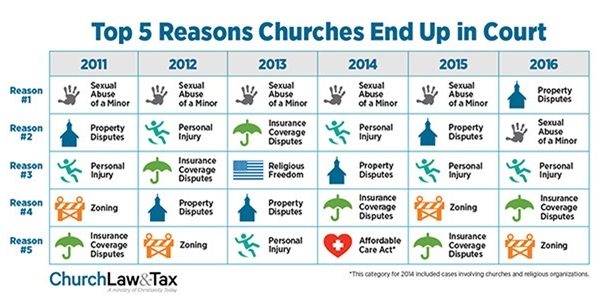

For the first time in a decade, there’s a new lawsuit leader.
But last year, the top reason for church litigation became a different problem: property disputes. More churches went to court in 2016 due to their building itself rather than any abuse that occurred inside of it.
The CLT analysis—a review of state appellate and federal court rulings—found that 8.7 percent of church court cases last year addressed property related-issues, down from 10.2 percent in 2015. However, property cases still ranked as the new No. 1 reason because child sex abuse fell even more, down to 8.3 percent in 2016 from 11.7 percent in 2015.
“There were fewer child abuse cases during 2016 than in prior years,” said CLT senior editor Richard Hammar, an attorney and CPA specializing in legal issues for churches and clergy. “Child abuse claims are dropping, but it is impossible to say if this an anomaly or a consequence of better risk management.”
The drop could be due to courts finally catching up with the backlog of lawsuits filed over past abuse.
“New suits are only likely to be for recent abuse situations—and heightened awareness in churches of the problem has hopefully reduced the number of new cases,” said Howard Friedman, a law professor and church-state expert who runs Religion Clause.
His blog has tracked property fights between congregations and their government officials, their neighbors, or their own traditions, as churches split from their denominations.
Most property cases “seem to arise from factional disputes between conservative and progressive wings of congregations,” said Friedman. “The increasingly divisive culture wars have moved into churches.”
3 Comments. Leave new
It’s all about the property, that the revisionist never paid for, because they don’t tithe, they live off property, dead peoples money, and blackmailing departing churches. Pretty plain and simple.
Again this is not rocket science. In the PCUSA churches, people do not really exist or count as either bricks or mortar or human beings. They are resource entities, to either be treated as commodities, aims to an end, or some other resource where value is to be extracted. Why does the PCUSA count people? Why do they take numbers and metrics so seriously? Not so much the intrinsic value of what they count. But if you count something you can assess it, tax it, measure it, value, extract some monetary settlement from it. So of course the PCUSA set sued, and all are in court fighting all the time. Treat people as things and objects, people tend to react to that, and not well. Its what the PCUSA wanted, and what they get.
As a father of two young children, I am very pleased to see that churches using background checks of all volunteers who want to work in children’s ministry is having the desired effect, evidenced by the drop in child sexual abuse cases from 11.7% to 8.3%. Now, if all churches would do this…